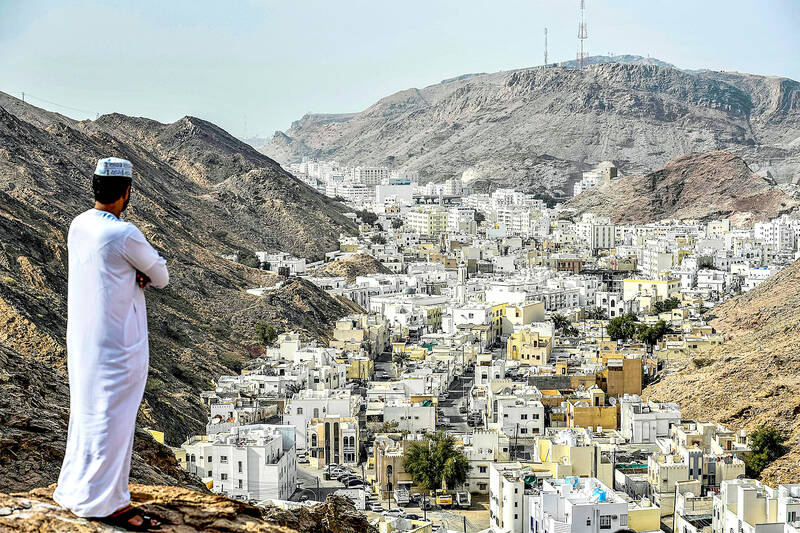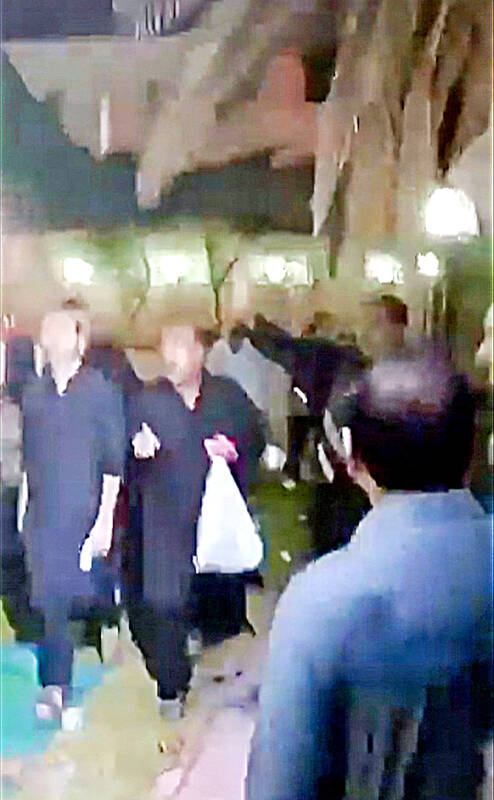Several gunmen burst into a Shiite mosque in the Gulf Arab state of Oman and opened fire, killing six people and wounding nearly 30 more, authorities said on Tuesday.
The Islamic State (ISIS) group, through an affiliated news agency, claimed responsibility for the attack in the capital, Muscat, without providing evidence.
It marked the first time that the Sunni Muslim group has asserted responsibility for an attack in Oman.

Photo: AFP file
That the Islamic State, which considers Shiites to be heretics, targeted Shiite worshipers on the eve of a holy day was nothing new — the group earlier this year claimed responsibility for an attack in Shiite-majority Iran that killed 84 people.
Most shocking, analysts said, was that the attack happened in Oman, a quiet country on the southeastern edge of the Arabian peninsula with well-trained security forces, a state policy of non-intervention and a majority population of Muslims that are neither Sunni nor Shiite.
“It illustrates that ISIS thinks outside of the box and tries to do things that most people think wouldn’t be possible, taking advantage of small failures within security architectures of different countries,” said Aaron Zelin, a senior fellow at the Washington Institute for Near East Policy.

Photo: AFP
There is no known branch of the Islamic State in Oman, a country that tends to stay out of the sectarian disputes roiling the wider region.
However, militant groups, including a local branch of al-Qaeda with a history of cross-border attacks, have exploited the chaos of that country’s war for much of the past decade.
The Royal Oman Police said that the shooting killed five people in the mosque in Muscat’s Wadi Kabir neighborhood and one police officer.
Omani authorities did not specify the number of gunmen or provide their nationalities, but said that security forces had killed three attackers.
At least 28 people were wounded in the shooting, police added, among them officers and medics.
The mosque was packed with people holding special prayers on the eve of the Shiite mourning festival of Ashoura, which marks the 7th-century martyrdom of the Prophet Mohammed’s grandson Hussein at Karbala in modern-day Iraq.
Pakistan identified four of the dead as its citizens.
Nearly 2 million migrants, mostly from South Asia, help power Oman’s economy by filling low-skilled jobs in construction and other fields.
Analysts described the shooting as the latest example that the Islamic State, after losing its territory in Iraq and Syria about five years ago, is returning to international acts of militancy.
“It makes them more resilient in some ways,” Zelin said of the strategy shift, citing a deadly attack in March on a Moscow concert hall, and other bombings across Afghanistan and Pakistan. “It’s part of their reorganization from being a group with most of its actions in Iraq and Syria to using their resources in a global network.”
The US embassy in Muscat issued a security alert, warning citizens to “stay vigilant.”
Like other sheikhdoms in the Persian Gulf, Oman retains tight controls on traditional media and its state news agency on Tuesday praised authorities’ success in containing the chaos, but offered scant information about the state of investigations.
In an interview with the Times of Oman, an English-language daily, an unidentified Pakistani witness reported that the shooting lasted for an hour and a half.
Statements of condolence and outrage came from across the region.
The sultanate maintains friendly relations with Saudi Arabia, the heartland of traditionalist Sunni Islam, and its regional rival, the Shiite power Iran.
Oman is unique in the world as the only country with a majority population of Ibadi Muslims — an offshoot of Islam predating the Sunni-Shiite split.
Many of Oman’s migrant workers hail from Pakistan, where the Islamic State’s regional affiliate, Islamic State Khorasan, has claimed a series of deadly suicide bombings and other attacks targeting Shiite mosques in the past few years.
“Pakistan stands in solidarity with the Sultanate of Oman and offers full assistance in the investigation,” Pakistani Prime Minister Shehbaz Sharif wrote on X, adding that he was “deeply saddened” by the shooting.

Airlines in Australia, Hong Kong, India, Malaysia and Singapore yesterday canceled flights to and from the Indonesian island of Bali, after a nearby volcano catapulted an ash tower into the sky. Australia’s Jetstar, Qantas and Virgin Australia all grounded flights after Mount Lewotobi Laki-Laki on Flores island spewed a 9km tower a day earlier. Malaysia Airlines, AirAsia, India’s IndiGo and Singapore’s Scoot also listed flights as canceled. “Volcanic ash poses a significant threat to safe operations of the aircraft in the vicinity of volcanic clouds,” AirAsia said as it announced several cancelations. Multiple eruptions from the 1,703m twin-peaked volcano in

A plane bringing Israeli soccer supporters home from Amsterdam landed at Israel’s Ben Gurion airport on Friday after a night of violence that Israeli and Dutch officials condemned as “anti-Semitic.” Dutch police said 62 arrests were made in connection with the violence, which erupted after a UEFA Europa League soccer tie between Amsterdam club Ajax and Maccabi Tel Aviv. Israeli flag carrier El Al said it was sending six planes to the Netherlands to bring the fans home, after the first flight carrying evacuees landed on Friday afternoon, the Israeli Airports Authority said. Israeli Prime Minister Benjamin Netanyahu also ordered

Former US House of Representatives speaker Nancy Pelosi said if US President Joe Biden had ended his re-election bid sooner, the Democratic Party could have held a competitive nominating process to choose his replacement. “Had the president gotten out sooner, there may have been other candidates in the race,” Pelosi said in an interview on Thursday published by the New York Times the next day. “The anticipation was that, if the president were to step aside, that there would be an open primary,” she said. Pelosi said she thought the Democratic candidate, US Vice President Kamala Harris, “would have done

Farmer Liu Bingyong used to make a tidy profit selling milk but is now leaking cash — hit by a dairy sector crisis that embodies several of China’s economic woes. Milk is not a traditional mainstay of Chinese diets, but the Chinese government has long pushed people to drink more, citing its health benefits. The country has expanded its dairy production capacity and imported vast numbers of cattle in recent years as Beijing pursues food self-sufficiency. However, chronically low consumption has left the market sloshing with unwanted milk — driving down prices and pushing farmers to the brink — while